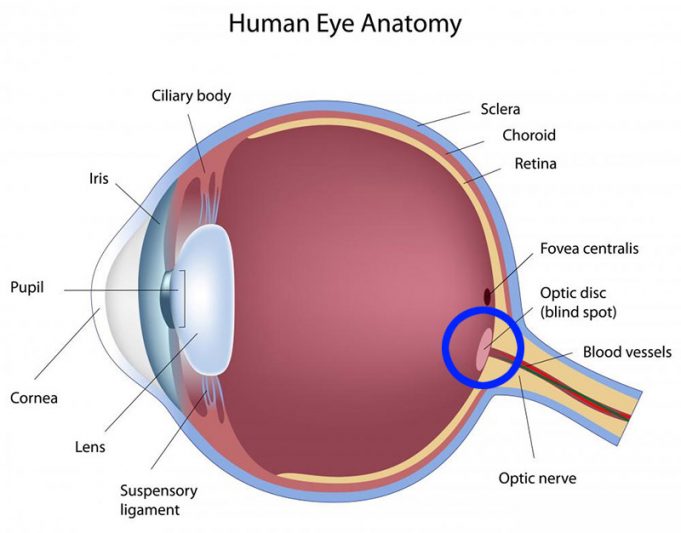A few months ago, I wrote an article Creating Your Life Handbook. In the article, I mentioned several things to list in your handbook, such as your strengths and weaknesses, your core values, and your blind spots. One of the readers, Darren, asked me what blind spots are, which inspired today’s post.
Blind Spots
Every time we open our eyes, light enters our pupils and shines onto our retina. Inside our retina are photoreceptors — nerve cells that interpret light and transmits the information to the brain. That’s how we see things.
The process is pretty straight forward, except there is a small area on our retina is where there are no photoreceptors. This is known as our blind spot.
Refer to the area circled in blue below. Since there are no photoreceptors at our blind spot, we’re not able to interpret any light shone in that section. This is why it is called the “blind” spot.

In theory, our blind spot areas should appear as black areas in our field of vision. But they are not — for those of us with working vision, we’re clearly able to see our surroundings, read all the words in a book, and see everything on our monitor screen just fine. Why is that the case?
That’s because our brain is able to assess our surroundings, estimate the missing spot, and project it in place of the blank space. Thanks to that, we get a complete vision of what’s before us like we do now.
The past few paragraphs may sound like mambo-jumbo if you’re a visual learner, so I’m going to show you an example. For the next few minutes, try the free Blind Spot exercise at this link. It shows you how our brain is able to project the background and fill up the empty space in the blind spot. The same applies no matter how complicated the background is. It just takes 2 minutes, so return when you are done. I’ll be here waiting :)
What Does The Exercise Show?
How was the exercise for you? What does it show?
This exercise shows that the mental projection by our brain isn’t an accurate reflection of the reality, even though it may look right and be right most of the time. While we may think that we can see everything, what we see before us may not be what’s really there.
This ties in with the concept of blind spots in personal development.
Blind Spots in Personal Development
Blind spots (defined in the context of personal development) refers to the aspects of ourselves we aren’t fully conscious of. This can refer to a broad spectrum of different things — our traits, values, actions, idiosyncrasies, habits, feelings, thoughts, etc.
For example, let’s say you dislike people who are arrogant. Why? Your immediate response may be that they make you feel uncomfortable or they are overbearing. But these are just surface-level reasons. What is the deeper reason behind why arrogant people affect you?
This reason is usually beyond our immediate observation — we can only identify it when we probe deeper. Blind spots aren’t immediately observable to us because we are always seeing things from our view. On the other hand, when we tap into the perspectives of people who have known us for a while or someone who is trained to identify blind spots, like a life coach, we can learn a lot about ourselves.
Besides our beliefs and attitudes, blind spots also include our physiological behaviors.
For example, I have always talked really fast since I was young. Everyone I meet would point this out, especially during my school years. It was typical for people to say that my rate of speech is like “a bullet train.” People often asked if I was in the debating team. One of my friends suggested that I become a rap leader, which I thought was hilarious! Even then, while I heard their comments and acknowledged their opinions, I never fully registered it as true. Because in my head, my rate of speech didn’t seem fast at all.
That is, until I saw videos and audios of my own presentations. I still remember the first time I played back an audio recording of my voice. My immediate thought was, Why on earth is this person talking so fast? It was quite hilarious because that thought popped into my mind the instant I heard my voice. Despite knowing that I would be hearing my voice, I couldn’t identify with it. The rate of speech was beyond what I had heard before!
Even after this incident, I continue to be unconscious of my rate of speech for a large majority of the time, until people (usually acquaintances) comment on it. Today it still happens, though I’m much more aware of it than in the past. It’s something that I’m now more conscious of since I speak at events and conferences. I try to slow down during my presentations and speeches, but beyond that I stick to my original talking speed when with friends.
Why Uncover Blind Spots?
Why is it important to know your blind spots? Because it is a necessary part of your personal growth. Blind spots are things that you are unaware of. Identifying our blind spots and understanding them heighten our self-awareness.
When we develop a greater self-awareness, we become more aligned with our higher selves, which means a greater self-mastery. Getting a personal coach is an excellent way to uncover your own blind spots so that you can improve.
Blind spots aren’t necessarily negative traits or weaknesses, though they usually are. When you are oblivious to something, there is a high likelihood that (1) you have never worked on it before, which leaves an opportunity for improvement, and (2) it serves as an invisible boundary that limits what you can do. For example, if you are not aware that you have poor time management skills, you will always operate within the confines of poor planning and prioritization, without knowing that it’s due to your lack of said skills. Or if you are not aware that you have poor communication skills, you may often feel frustrated when communicating with others, without realizing that it’s due to the gaps in said skills.
When you uncover your blind spots and actively work on them, you become more conscious of your strengths and opportunity areas, and the boundaries that you are operating within. If you don’t uncover these blind spots, you will never be able to work on them, simply because you aren’t aware of their existence.
As someone who is passionate about growth, I’m always on the lookout for situations when I feel resistance or when my consciousness is lowered, as it indicates a blind spot. On my blog, I open myself to feedback that I receive from readers, whether positive or negative. During my 1-1 coaching, I would encourage my clients to provide feedback to help improve the coaching sessions.
Over the years, I’ve uncovered many blind spots and worked on them. In the past, my neurotic perfectionism often resulted in myopia and ineffective work patterns, which hindered me from achieving greater results. It also made me an angsty person, which I didn’t like. My emotional stinginess also made me an unpleasant and selfish person. These blocked me from being the person I wanted to be. It was by consciously work on these blind spots that I’ve worked on these issues and improved as a person.
Just like growth is a lifelong journey, the process of uncovering blind spots never ends. With every blind spot that we identify and tackle, there is always a next blind spot to uncover. Due to the vastness of our mind and the infinite nature of growth, it is impossible to identify every single blind spot within us, right now. What’s more important is to work on improving every second, every moment, as we move forward in our life’s journey. :)







 I hope you find my content helpful. Join my community of 65,000 readers and get my latest articles delivered to your inbox. Your email is safe and I never send spam.
I hope you find my content helpful. Join my community of 65,000 readers and get my latest articles delivered to your inbox. Your email is safe and I never send spam.
I’m writing a blog on blind spots too now and found your article. Great reading and I love your points. Thanks for sharing them. I’ll link to yours in my blog as well!
Commenting for this post is closed.